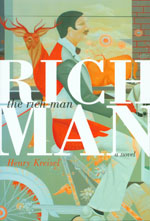This new edition of a classic Canadian Jewish novel tells the story of Jacob Grossman, a middle-aged immigrant tailor who travels from Toronto to pre-World War Two Europe. The novel's action opens in
A classic of Canadian Jewish literature for over fifty yearsThis new edition of a classic Canadian Jewish novel tells the story of Jacob Grossman, a middle-aged immigrant tailor who travels from Toronto to pre-World War Two Europe. The novel's action opens in 1935, with a striking portrait of Toronto's working-class Spadina Avenue district. Kreisel's narrative leap of genius is his depiction of Grossman's decision to return to reacquaint himself with his family and his boyhood home of Vienna.
Wearing a new white suit, an extravagance bought especially for the trip, he is mistaken for a rich man, and the charade he undertakes to maintain this image complicates an already difficult visit. Grossman finds Vienna transformed by the rise of Nazism and the slow, inexorable deterioration of Austria's prominent Jewish community.
Kreisel's insights into the forces that would lead the world to war are uniquely revealing. His portrait of prewar Jewish life in Europe and Canada helps us better understand the oncoming Holocaust.
Henry Kreisel's The Rich Man was among the first books by a Jewish writer on Jewish themes to be published in Canada.
With a new introduction by the Chair in Canadian Jewish Studies at Concordia University and editor of Red Deer's Canadian Jewish writing series, Dr. Norman Ravvin.
"A brilliant portrait of pre-war Jewish life in Europe and Canada."
-- The Globe and Mail
View Review text
From prisoner in a British internment camp on Canadian soil to Officer of the Order of Canada, Henry Kreisel (1922-91) wrote from a depth of experience. Born in Vienna, he fled the Anschluss, only to be imprisoned by the British as an "enemy alien" and shipped to Canada. Despite this, Dr. Kreisel completed his education and rose in the ranks of the University of Alberta, joining the Faculty of Arts in 1947 and becoming the Chair of English (1961-67) and Comparative Literature (1967-87).
View Biographical note


